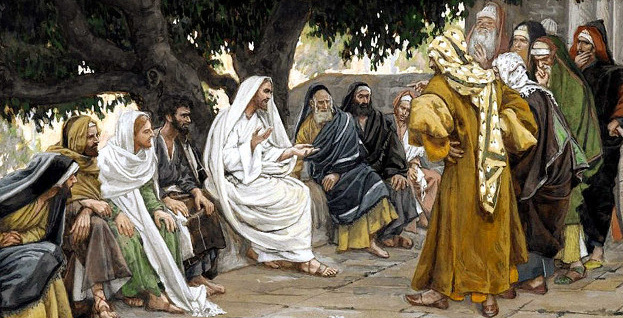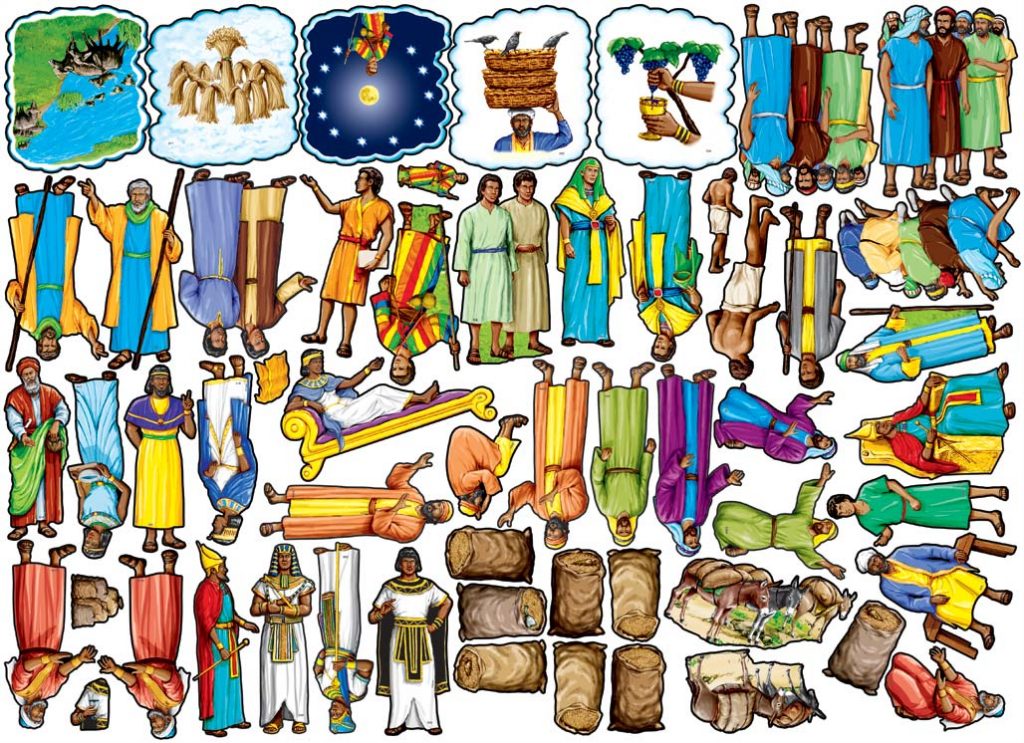One of the themes I deal with, fairly briefly, in The Generations of Heaven and Earth is how important it is that the Genealogical Adam hypothesis grounds the Bible in history – real history.
One of my perennial beefs, in daily church life and particularly in how children are taught in Sunday School, is what I call the “Flannelgraph Bible.” This is exemplified by the way that everyone in Bible stories, from the Chalcolithic progenitors in Genesis, to the hellenized Roman Judeans of the gospels, is depicted as dressed in nineteenth century bedouin tea-towels.

This indifference to cultural context has more serious effects, for the whole Bible narrative becomes a self-contained Flannelgraph world, in which biblical characters relate to God in a way entirely divorced from our own life in the Spirit, and in which even God operates entirely differently from the “real” world of experience.

To give but a couple of examples, in Scripture God sends plagues or storms – but in our world, disease and weather are entirely due to “natural” causes that “just happen.” Likewise, in Scripture God displaces nations (see Deut 2:18-23) and indeed determines the exact times and places for people movements (Acts 17:26), as well as raising up and displacing thrones and empires (see the whole book of Daniel), whereas in our world politics is determined entirely by people, whether by democratic voters or by totalitarian dictators.
In this way, the Bible becomes divorced at every level – the personal, the hsitorical, and even the scientific – from the real world. Instead it becomes a self-contained world insulated from the rest of life. Perhaps we believe it – but we believe it in the same way that we “believe” a great novel, by suspension of disbelief.

Those more candid than others accept this fictional assessment, and translate everything in the Bible as “myth”. But as has often been pointed out, Christianity (and Hebrew religion before it) are irreducibly historical faiths: the Bible is almost entirely about what God has done, and is doing, in the world for his people.
Sadly, the most extreme instance of this “Flannelgraph” process is the young-earth version of the early chapters of Genesis, which runs up against our other experience of reality at all these levels. Personally, we do not encounter talking snakes or spiritual trees, nor demonic marriages, nor angels with flaming swords, and so on. Science gives no back-up to a material creation in seven days, and fields of historical study from archaeology and genetics to linguistics and history itself leave no room for an original human couple in an empty world a few thousand years ago.
Therefore, for those wanting to avoid merely metaphorical interpretations, biblical history has to be pitted against all other sources of historical information. Once more, as in the Flannelgraph phenomenon, the Bible becomes isolated and insulated from the rest of human experience. Indeed, much of that experience has to be rejected or, at least, entirely distrusted.
When it comes to one of my main theological interests, biblical theology, the attempt to find a unified narrative that we might loosely term “salvation history” can be really successful, as scholars like John Sailhamer or Greg Beale and even N. T. Wright have shown. But since that narrative’s root in the world of broadly accepted history is so often cut off at the Garden of Eden, biblical theology tends to leave the Bible as a self-contained story divorced from the stream of time. In other contexts we would call that a novel, or even a myth.
Yet that is not the approach the Bible itself takes to God’s interaction with the world. After the Exodus, Moses is keen to emphasise the glory that has come to Yahweh as the nations have witnessed his great salvation of Israel from Egypt. That appeal to shared history is maintained in a number of psalms that also speak of Yahweh’s reputation amongst the nations.
Conversely his severe judgement of Israel is said to make them a byword among the nations, which also see these events as God’s power at work amongst them.
In the New Testament, too, the appeal to the historical facts of Jesus’s life, death and resurrection is everywhere seen. As Paul says to King Agrippa in Acts, “The king is familiar with these things, and I can speak freely to him. I am convinced that none of this has escaped his notice, because it was not done in a corner.”
Now, in point of fact historical investigation, and especially archaeology, have demonstrated the Scriptural intersections with history pretty well. By its very nature, ancient history is a jigsaw with mostly missing pieces, and so there must always be the possibility of denying the biblical history where supportive evidence is lacking, especially when it covers individuals who were not inscription-carving emperors. But very many biblical characters have been attested in inscriptions, historical events match those recorded elsewhere, cultural customs and mores match those known from other sources, and even the literary conventions of the Bible’s chroniclers, prophets and hymn-writers fit known historical sources from surrounding nations.
The biggest problem, though, has remained that root in the garden of Eden. Without going into detail here (as I have elsewhere on The Hump and do in the book) all the major themes of “salvation history” (that is to say, the entire subject matter of the Bible) have their source in the garden narrative, whether we are talking about the nature of spiritual humankind, its intended relationship with God, and its Fall into the sin and death to which Christ became the solution. Not only do these later events stem from Eden, but they recapitulate it and correct it in numerous ways.
If you read any of the major writers of biblical theology, from Graeme Goldsworthy through to Greg Beale, you will see how Eden is the foundation on which the Bible history is built. Furthermore, attempts to show that the Bible writers themselves, notably Paul, did not regard the historicity of Adam to be important, have not found great support amongst exegetes. For example, Scott McKnight’s arguments against the importance of an historical reference to Adam in Romans 5 is far from compelling, except to those accepting his co-author (in Adam and the Genome) Dennis Venema’s claim that science makes such a history impossible.
And that, Ladies and Gentlemen, is why Genealogical Adam and Eve is so crucial, and so liberating to the Christian spirit. It roots the whole edifice of Scripture’s metanarrative back into the soil of history, where it belongs, and so restores the Bible to what it always was – the story of God’s saving and glorifying activity in our world, and not in some alternative reality which, to be believed, entails rejecting history. It witnesses to sinners by the strong appeal of history, rather than requiring them to reject history.
If you want to know more, read my book when it comes out </plug>


Howdy!
How are you Jon? What a nice surprise it is to land on your site once again to see you are publishing what ought to be a very interesting book. You should be proud of your achievement.
I like what you are saying here in relation to the bible being grounded in history. But that seems to be the biggest issue I am having (as I am sure you have heard me say repeatedly. As you know I am a big Mike Heiser devotee, but the biggest issue I have with him is his inability to deal with the question of “An event being believed to have happened, vs. it ACTUALLY have happened”. To make matters worse, he always ends up saying “the bible is not here to teach science” or the famous “the ancients weren’t talking about genetics”. And I just want to shout out at him. “Yes, we already know that. It’s NOT about science. It’s about HISTORY. History! History! History.” One reviewer of his work said:
“….but Heiser’s view on the divine inspiration and historicity of the Bible was rather unclear to me. Heiser seemed to argue that the divine-human unions in Genesis 6 and the Tower of Babel story in Genesis 11 were Jewish responses to Babylonian or Mesopotamian claims. Does that imply that they were stories created during the exilic period and did not actually happen in history?…..”
Heiser and even people like John Walton say this all the time, but want you to believe the events happened as is. Well how can you have it both?
So by extension, historic Adam and Eve is just one component of the story. There is the part of them living in the Garden. Did that happen? When? Where?
Did the flood happen? When? Where?
Are we supposed to believe it is a product of the Jewish exile in Babylon? But if they really happened wouldn’t these stories been written regardless of an exile?
Hi Hanan – good to hear from you.
These are the kind of questions I try to address in GHE, the basic premise being that if Adam and Eve are genealogical ancestors, then they can be part of a genuine historical tradition – subject always to stylistic treatment and literary purpose, as is all history.
If that’s so, we may expect, going forward, to find a historical basis for the rest of the historical accounts both in in Gen 1-11 and after. Of course, one can never prove the truth of the accounts, but that would be science, rather than history (which as you say is not the issue).
One instance I deal with at length: There are clear parallels between Adam and the Exile. Liberal explanation: The Eden narrative was made up retrospectively to embody those parallels. Conservative explanation: the exile was a recapitulation of the sad origins of mankind itself.
Which to prefer? To me, the bitter experience of exile would not be mitigated in any way by a new story saying something like it happened in ancient times. Furthermore, if it were sold to me as the true origin of mankind and/or Israel’s forbears, I’d ask how come I never learned that story in Sabbath School.
On the other hand, if the story was already part of the Hebrew tradition (and Kenneth Kitchen points out that in its present form it probably dates from around the same time in the early 2nd millennium as the parallel Mesopotamian sources like Eridu Genesis, Atrahasis etc) then the proto-history of Gen 1-11 (a) makes a logical preamble to the nation’s origin in the call of Abram, (b) strikes to the heart of the nation’s conscience in realising that their special calling has gone awry, as the earlier call of Adam had done (c) gives them indications of divine grace and forgiveness and (d) reminds them that their original calling was always to nationhood for the world’s blessing, and not simply their own benefit.
A literary caveat: there seems to be a tendency amongst biblical theologians to see the composition of the Pentateuch in at least two phases, the second of which may well be post-exilic and re-emphasising the theological trajectory of the nation. But that’s not the same as a newly-minted tale with, to me, rather limited application to an exiled people.
My favourite sources on all this will be in the bibliography, which I’ll put online even if you don’t do the decent thing and buy the book ( 😉 ). But one goodie on historicity in general is: *Do Historical Matters Matter to Faith* edited by Hoffmeier and Magary (Crossway, 2012).
You make a good point that just because something is written later, doesn’t necassarily mean the story was created at that point. It could possibly mean that the *writting* itself was shaped by the exile, but the belief already existed. But I have to admit, it still admit it leaves me in a quandary. I know you said we can find historical basis for other stories, but I left to ask how? Let me go back to Heiser for a moment. Heiser contends – and I think perhaps rightfully – that Abraham and his seed’s job is to undo Babel, and to bring the whole family of man in relationship to God. Ok, now let’s take a moment to think about this. The only way this could make sense is that about 5000 years ago (or less) all mankind was concentrated in one city and then somehow dispersed by God. Is this not what the Torah says? Let’s remember what you said, the theology has to be grounded in history. So then when did this occur? We should be able to open a history book and make a good assumption as to when this happened.
But did it? Isn’t everything we know about populations, and cities and the migration of mankind tell us there were cities all around long before Babel, and that migration of man had all ready occurred without the city of Babel being involved. If so…..then how is the main theology rooted in history? How can Abraham’s seed bring mankind *back* into God’s family if they were never there to begin with? So Heiser is wrong to say the gentiles ought be brough *back* to the family of God, but instead it should be they ought to be *introduced* to the family of God.
This is where one needs to think in terms of divine authorship (often neglected in critical studies), first in overseeing the “meta-themes” of Torah (and the whole of Scripture), and then in governing history itself, and then in selecting (as all historians do) what within history is significant to the themes.
So, in literary terms (ie, in the way Genesis unfolds), the call of Abraham is clearly described in terms that make it the beginning of God’s response to Babel, and not only Genesis but the whole Bible is about the reunification of man to God, whose antithesis the Babel story obviously demonstrates.
How that relates to your last point depends on how one defines the original problem of the world – which is what I do in the book, and there’s not space to go into here.
More generally, though, as history, divine or otherwise, it would be legitimate to take a contingent event like Babel as paradigmatic of the state of Adamic man (or, according to interpretation, of proto-Israel). It could be similar to the way in which, say, the example of Auschwitz might be used as emblematic of the whole Holocaust – or even of some wider problem, depending on ones historical purpose: anti-semitism or racism, or even the human propensity for dreadful evil, can be and have been represented by those camp gates. To do that rather than, like a new film or play I read about, focusing on Auschwitz’s significance for one inmate, is an authorial choice dependent on ones purpose: in the case of Genesis, the focus is on the vocation of Israel for all mankind, through Abram.
In other words, I would take Babel, in context, as in some way saying, “Look where Adam’s sin ended up, making Abram necessary.” If that were ones total interpretation (and it’s only part of mine) then more detailed literal interpretations about the scattering of a geographically-concentrated mankind would be called into question. There were undoubtedly many other cities, as you rightly say. Still, the author could use that one event as emblematic of the disruptive effects of sin, leaving the scattering-gathering theme intact.
In my book I attempt some other explanations, particularly putting Babel into the historical context of the Table of Nations, and drawing on some thoughts by Richard Middleton about what known historical events the Babel tale might represent. None of that alters Heiser’s point fundamentally, but it maybe focuses understanding – and also grounds it in real events better.
In this way, history informs interpretation, and vice versa, since a Scripture one believes to be inspired is the primary source, rather than the events themselves. In other words, complex historical events do not necessarily point to their own significance – the historian’s job is to select and describe events in order to show their meaning.
I guess that’s the biggest point of my new book in the context of Genealogical Adam: my contention is that if Adam actually was one man drawn from an existing race in a new way, it’s likely that the human authors, and certainly the divine author, wrote the Bible from that understanding, and that we have forgotten that foundation and so missed some of the richness. There is a difference between interpretive history and myth-making, though they are both legitimate sources of truth, and they overlap where historical events form ones understanding of the world (the Exodus and the Cross both being historical events that explain the meaning of history).